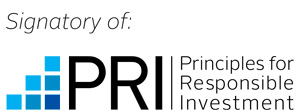The MEAG ESG strategy
Sustainability strategy
MEAG is the global asset manager of Munich Re Group. Our focus is on achieving lasting sustainable growth with the investments of our clients, which include Munich Re, ERGO and other non-Group institutional and private clients. Our core competency lies in liquid assets and increasingly in alternative investments such as real estate, infrastructure, renewable energies and agriculture and forestry. Among our particular strengths are our many years of expertise in the field of risk management and our in-depth understanding of the needs of investors that want to cover their payment obligations with the cash flows from their assets.
We strive to exceed our clients' demanding goals while at the same time making a significant contribution to a sustainable world by systematically considering the sustainability aspects of investments in all relevant asset classes. To this end, we adhere to, among other things, the United Nations Principles for Responsible Investment (UN PRI), which Munich Re was one of the first companies in Germany to sign in 2006. To further strengthen the Group's commitment, MEAG has also signed the UN PRI in 2021.
MEAG's Management Board is responsible for the sustainability strategy, with the support of the company's ESG department, which advises MEAG's business units on sustainability issues and helps them implement the strategy.
ESG Governance
To ensure company-wide alignment on ESG strategy, implementation and communication, MEAG has set up a new ESG Governance in 2022. The MEAG ESG Committee (voting members: Chief Administration Officer, CIO Alternative Assets, CIO Public Markets, Chief Customer Officer, Head of ESG & Sustainable Finance) decides on strategic ESG matters, while the MEAG ESG Management Team is responsible for the MEAG-wide ESG implementation. A dedicated ESG Team with a direct reporting line to the Management Board of MEAG is responsible for enabling compliance with ESG regulation in cooperation with the legal department. The legal department is staffed with dedicated ESG experts. Further, the ESG team develops ESG guidelines and implementation measures and empowers ESG product development and communication.
The MEAG ESG team is supported by ESG multipliers across the different investment management and portfolio management teams. Staff members functioning as multipliers are actively sharing their knowledge on ESG integration within their own department and continuously build asset-class-specific ESG expertise.
Training
MEAG provides regular awareness raising sessions on ESG, addressing topics such as ESG trends and regulation for all employees. Numerous employees from MEAG’s investment management, portfolio management and credit research teams are offered in-house training on ESG in cooperation with MEAG’s ESG data providers MSCI ESG and ISS or have been trained to become certified ESG analysts.
Further developing the Stewardship efforts of Munich Re and MEAG1
Stewardship has become a tool of choice for ESG implementation thanks to its potential to create real-world impact through the dialogue with investee companies. After successful engagements with a focus on climate, Munich Re and MEAG are excited to now expand the scope to Human Rights starting with a first step to become endorser of the PRI Advance Stewardship Initiative. The initiative serves as a platform for investors to discuss Human Rights and social issues in investee companies and to foster positive change for employees and society. Besides the climate and net zero focus, Human Rights is another key aspect within the ESG integration approach of Munich Re Group’s Responsible Investment Guideline (RIG).
The RIG provides our framework for Munich Re Group investment activities on an entity-level, and specifies, amongst others, exclusion criteria for investments in companies not in line with expected Human Rights conduct.
Our support of the PRI Advance stewardship initiative now expands the instruments we can use to integrate Human Rights aspects into the investment decision process with the potential to generate real world impact.
Therefore, we support the investor statement of PRI advance: https://dwtyzx6upklss.cloudfront.net/Uploads/w/x/y/advance_investorstatement_17may2022_339587.pdf
1 MEAG in terms of this statement comprises: MEAG MUNICH ERGO AssetManagement GmbH, Munich; MEAG MUNICH ERGO Kapitalanlagegesellschaft mbH, Munich; MEAG New York Corporation, New York; MEAG Hong Kong Limited, Hong Kong



